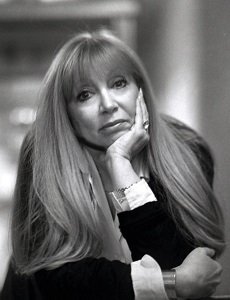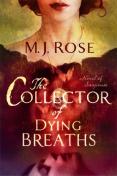BKMT READING GUIDES
The Collector of Dying Breaths: A Novel of Suspense
by M. J. Rose
Hardcover : 384 pages
5 clubs reading this now
3 members have read this book
Florence, Italy—1533:
An orphan named René le Florentin is plucked from poverty to become Catherine de Medici’s perfumer. Traveling with the young ...
Introduction
From the internationally bestselling author, a lush and imaginative novel that crisscrosses time as passion and obsessions collide
Florence, Italy—1533:
An orphan named René le Florentin is plucked from poverty to become Catherine de Medici’s perfumer. Traveling with the young duchessina from Italy to France, René brings with him a cache of secret documents from the monastery where he was trained: recipes for exotic fragrances and potent medicines—and a formula for an alchemic process said to have the potential to reanimate the dead.
In France, René becomes not only the greatest perfumer in the country, but also the most dangerous, creating deadly poisons for his Queen to use against her rivals. But while mixing herbs and essences under the light of flickering candles, René doesn’t begin to imagine the tragic and personal consequences for which his lethal potions will be responsible.
Paris, France—The Present:
A renowned mythologist, Jac L’Etoile—trying to recover from personal heartache by throwing herself into her work—learns of the sixteenth-century perfumer who may have been working on an elixir that would unlock the secret to immortality. She becomesobsessed with René le Florentin’s work—particularly when she discovers the dying breaths he had collected during his lifetime.
Jac’s efforts put her in the path of her estranged lover, Griffin North, a linguist who has already begun translating René le Florentin’s mysterious formula. Together they confront an eccentric heiress in possession of a world-class art collection, a woman who has her own dark purpose for the elixir . . . for which she believes the ends will justify her deadly means.
This mesmerizing gothic tale zigzags from the violent days of Catherine de Medici’s court to twenty-first-century France. Fiery and lush, set against deep, wild forests and dimly lit chateaus, The Collector of Dying Breaths illuminates the true path to immortality: the legacies we leave behind.
Editorial Review

I was fortunate enough to read a preview copy of M. J. Rose's gorgeous new novel, The Collector of Dying Breaths, and was so sad when I ran out of pages. Here, M. J. sits down with me and discusses the specific process of writing this book and answers more general questions about writing.
SG: Can I just say what a joy it was to read your book, and that it was a wonderful coincidence that I did so in a 15th century villa less than an hour from Florence? How did you manage to produce such vivid descriptions of the past in your novel?
MJR: Itâ??s a challenge. I spend a lot of time reading art books, studying antique maps and prints, and wandering in museums looking at paintings created during the time period I write about. I also do pretty exhaustive searches looking for and then reading diaries and letters written by people during the years when the novel is set.
I also have some fairly esoteric rituals. I write my first drafts in longhand with an antique fountain pen and a green ink. I used a particular kind of lined journal thatâ??s been made the same way for over 100 years. I donâ??t use electric light, and if I canâ??t write in natural light, I actually light candles and burn old incense.

And lastly, for each novel, I find a talisman from the period that I wear when writing. For Collector, it a was manâ??s silver and amethyst ring that I found in an antique store that in my imagination was a gift Catherine de Medici gave René le Florentin, her perfumer and the man who created poisons for her to use on her enemies.
SG: As you so passionately show, sometimes thereâ??s only a fine line between potion and poison. Were you also trying to show that there is the same kind of fine line in the emotions felt between brothers and sisters and between lovers who endure through time?
MJR: I wasnâ??t focused on either of those themes consciously, but it is the fine lines that are the most interesting in life, arenâ??t they? One of the amazing things I learned about perfumes and poisons is how little it can take to turn a perfume or herbal remedy into a poisonâ?¦one extra drop of an extract or of crushed seeds can make a lovely tincture a deadly draught.
I think itâ??s the same way with people. We have to be careful of how we treat each other. Our emotions swing wildly during the course of a relationshipâ?¦and itâ??s in the balance that we find our footing.
SG: You had me guessing the whole timeâ?¦to the very end! Do you have a method for creating that kind of suspense?
MJR: I wish I did because each book might be a bit easier to write. When I start a book I know the beginning of the story, and five or six beats along the way and I know the very end. But I never know how I am going to make the journey, and so as I write Iâ??m actually challenging and surprising myself.
SG: How did you become interested in writing a novel about the idea of capturing someoneâ??s â??dying breath?â?? Where did that concept come from?
MJR: I was doing research on another book and learned that Thomas Edison and Henry Ford, who both believed in reincarnation, supported the idea that in death, the soul leaves the body with its last breath. Edisonâ??s dying breath, collected by his son, Charles, is in fact on display at the Edison Winter Home in Fort Myers, Florida. I was totally taken with the idea of our souls being expelled in that last breath, and it became the basis of the novel.
SG: Your ability to convey the scents you write about was masterful. I truly was smelling while reading. Have you ever made perfume? Where did your interest in the subject come from?
MJR: I first experimented with making perfume when I was eight years old and read about the process in a book that described mixing flower extracts with alcohol. So I took what I found around the apartment â?? my motherâ??s rose and lavender potpourriâ??added some dried eucalypts leaves since I liked their scent, and then filled up the bowl with vodka (which I took from the liquor cabinet). It smelled horrific, but I fell in love with the idea of being a perfumer.
About twenty years later, I was working in advertisingâ??aka Mad Men land--and was assigned to a fragrance launch, from the very first days of naming it through the TV commercials we shot in Hong Kong and edited at the Lucas Ranch. It was a 40 million dollar launch that culminated with the spots running on the Oscars. During that time, I became re-intrigued and besotted with everything about the 8th art, as fragrance is called, and itâ??s a passion thatâ??s never left.
SG: You and I have talked about empathyâ??how important do you think it is to be an empath while a writing a novel. How much more complicated does that make your life?
MJR: I think being empathetic helps enormously, especially in creating full characters. A character shouldnâ??t be all good or all bad â?? that makes him or her predictable and boring. Take the character who has just stolen a loaf of breadâ?¦. Jean Valjean is a criminal who belongs in jail until you learn he took it to feed his sisterâ??s seven starving children. The minute the reader learns that and empathizes, they are emotionally engaged. Thatâ??s when a novel delivers and satisfies the reader (the ways yours always do).
SG: Satisfactionâ?¦yesâ?¦thatâ??s hard to do without using clichés and being predictable. But I thought you pulled off the â??happily ever afterâ?? in such a wonderful way.
MJR: Coming from you, Iâ??m especially honored to hear that. I was very worried about giving my characters a HEA; most of my other novels have slightly more ambiguous endings. But these characters created their endingâ?¦they just let me in on it so I could write it down.
Excerpt
Chapter 1March 1, 1573 BarBizon, France
Written for my son to read upon my death, from his father, Rene? le Florentin, perfumer to catherine de Medici, Queen Mother.
It is with irony now, forty years later, to think that if I had not been called a murderer on the most frightening night of my life, there might not be any perfume in Paris today. And that scent—to which I gave my all and which gave me all the power and riches I could have hoped for—is at the heart of why now it is I who call myself a murderer. ...
Discussion Questions
No discussion questions at this time.Book Club Recommendations
Recommended to book clubs by 2 of 2 members.
Book Club HQ to over 90,000+ book clubs and ready to welcome yours.
Get free weekly updates on top club picks, book giveaways, author events and more








